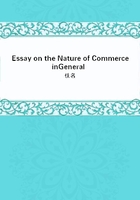
第50章
Infinite inductions might be added to justify these ideas of foreign trade and the advantages of abundant money. It is astonishing to observe the disproportion in the circulation of money in England and in China. The manufactures of the Indies, like silks and printed calicoes, muslins, etc. in spite of a sea voyage of 18 months, are at a very low price in England, which would pay for them with the thirtieth part of her articles and manufactures if the Indians would buy them. But they are not so foolish as to pay extravagant prices for our work while work is done better and infinitely cheaper in their own country. So they sell us their manufactures only for ready cash, which we carry to them annually to increase their wealth and diminish our own. The Indian manufactures consumed in Europe only diminish our money and the work of our own manufactures.
An American who sells beaver skins to a European is rightly astonished to learn that woollen hats are as serviceable as those made of beaver, and that all the difference, which causes so long a sea journey, is in the fancy of those who think beaver hats lighter and more agreeable to the eye and the touch. However as these beaver skins are ordinarily paid for to the American in articles of iron, steel, etc. and not in silver, it is a trade which is not injurious to Europe, especially since it supports workmen and particularly sailors, who in the needs of the state are very useful, whilst the trade with the manufactures of the East Indies carries off the money and diminishes the workmen of Europe.
It must be admitted that the East India trade is profitable to the Dutch Republic and that she makes the loss of it fall on the rest of Europe by selling the spices and manufactures in Germany, Italy, Spain and the New World, which return to her all the money which she sends to the Indies and much more. It is even useful to Holland to clothe her women and other folk with the manufactures of India rather than with English or French fabrics.
It suits the Dutch better to enrich the Indians than their neighbours who might profit by it to oppress them. Moreover they sell to the other peoples of Europe the cloths and small manufactures of their own raw produce much dearer than they sell the Indian manufactures at home where they are consumed.
England and France would be mistaken to imitate the Dutch in this respect. These kingdoms have at home the means of clothing their women with their own raw material, and though their fabrics are dearer than those of Indian manufacture they should prevent their people from wearing the foreign material. They ought not to permit the falling off of their own articles and manufactures nor become dependent on the foreigner, still less allow their money to be taken away for that purpose.
But as the Dutch find means to sell Indian merchandise in the other states of Europe, the English and French should do the same, whether to diminish the naval power of Holland or to increase their own, and above all to do without the aid of Holland in the branches of consumption which a bad habit has rendered necessary in these kingdoms. It is an evident disadvantage to allow the wearing of Indian fabrics in the kingdoms of Europe which have wherewith to clothe their people with their own products.
Just as it is disadvantageous to a state to encourage foreign manufactures so it is to encourage foreign navigation.
When a state sends abroad its articles and manufactures it derives the full advantage if it sends them in its own ships. It then maintains a good number of sailors who are as useful to the state as workmen. But if it leaves the carriage of them to foreign vessels it strengthens the foreign shipping and weakens its own.